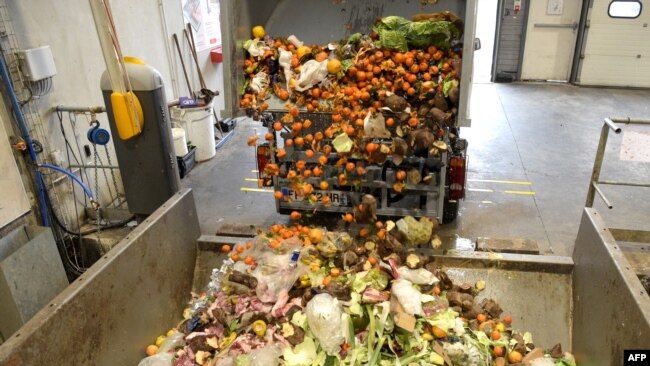유엔: 식량 손실, 폐기물은 세계의 기아, 기후 변화를 악화시킵니다.
UN: Food Loss, Waste Exacerbate Global Hunger, Climate Change
페이지 정보
작성자 Lisa Schlein 작성일 22-09-29 08:47 댓글 0본문

파일 - 11월 프랑스 스타인스에서 트럭이 과일과 채소의 생물 폐기물을 싣고 있습니다.
FILE - A truck offloads bio-waste of fruits and vegetables, in Stains, France, Nov. 19, 2021.
제네바입니다.
Geneva —
유엔은 목요일 국제 식량 손실과 폐기물 인식의 날을 기념함에 따라 식량 손실과 폐기물의 종식을 촉구하고 있습니다.
U.N. agencies are calling for an end to food loss and waste as the United Nations marks the International Day of Awareness of Food Loss and Waste Thursday.
유엔 환경 프로그램 보고서는 2019년에 9억 3천만 톤 이상의 음식물 쓰레기가 발생했다고 밝혔습니다. UNEP의 에너지 및 기후 지부장인 Mark Radka는 그것이 이용 가능한 음식의 약 20%를 차지한다고 말했습니다.
A U.N. Environment Program report says over 930 million tons of food waste were generated in 2019. The chief of UNEP’s energy and climate branch, Mark Radka, said that represents about 20% of available food.
가계 음식 쓰레기가 국가 소득 수준과 상관없이 모든 국가에서 비슷한 1인당 수준에서 발생한다는 증거가 있습니다," 라고 그가 말했습니다. "그래서, 가정들은 평균적으로 1인당 연간 약 74kg의 음식물 쓰레기를 배출합니다."
“There is evidence that household food waste is generated at a similar per capita level in all countries, regardless of country income level,” he said. “So, households, on average generate about 74 kilograms per person, per year in food waste.”
전 세계 8억 2천 8백만 명의 사람들이 굶주리고 있다는 유엔의 최근 추정치를 고려할 때, 이것은 심각한 영향을 미칩니다. 식량농업기구의 조사 결과에 따르면 전 세계 식량 중 14%가 수확 후 손실됩니다. 약 17%가 소매업과 소비 단계에서 낭비되고 있습니다.
It has serious implications, given the U.N.’s latest estimates that 828 million people globally are going hungry. Food and Agriculture Organization findings indicate 14% of the world’s food is lost after harvest. An estimated 17% is wasted in retail and at the consumption stage.
FAO 고위 기업 개발 책임자인 Rosa Rollle은 식량 손실과 폐기물이 기후, 식량 안보 및 농업 식량 시스템의 지속 가능성에 중대한 영향을 미치는 세계적인 문제라고 말합니다.
FAO Senior Enterprise Development Officer Rosa Rolle calls food loss and waste a global problem that has significant impact on climate, food security, and the sustainability of agri-food systems.
지난 2년 동안, 전 세계의 농업 식품 시스템은 COVID-19 팬데믹, 기후 변화 및 우크라이나 전쟁으로 인해 혼란에 빠졌고, 수백만 명의 사람들이 식량 불안으로 내몰렸고, 기아와 영양 실조가 증가하고 있습니다."라고 그녀는 말했습니다.
“Over the past two years, agri-food systems across the globe have been disrupted by the COVID-19 pandemic, climate change and the war in Ukraine, pushing millions of people into food insecurity, with hunger and malnutrition on the rise,” she said.
FAO는 식량 낭비와 손실이 기후 변화를 가속화하고 환경을 해친다고 말합니다. 지구 온난화로 이어지는 총 온실가스 배출량의 약 31%가 농식품 시스템 때문이라고 밝혔습니다.
The FAO says food waste and loss accelerate climate change and harm the environment. It says about 31% of total greenhouse gas emissions, which lead to global warming, are attributable to the agri-food system.
UNEP는 식량 손실과 폐기물을 줄이는 것이 2030년까지 메탄 배출량을 15%까지 줄일 수 있다고 말합니다. 그것은 메탄이 대기에 도달한 후 첫 20년 동안 이산화탄소의 80배 이상의 온난화 힘을 가지고 있다고 지적합니다. 메탄에 의한 오늘날 지구 온난화의 최소 25%가 인간의 작용에 의한 것이라고 합니다.
The UNEP says reducing food loss and waste could decrease methane emissions by 15% by 2030. It notes methane has more than 80 times the warming power of carbon dioxide over the first 20 years after it reaches the atmosphere. It says at least 25% of today’s global warming by methane is caused by human action.
출처 : VOANews
댓글목록 0
등록된 댓글이 없습니다.

















